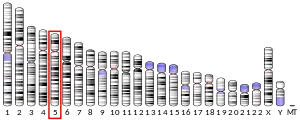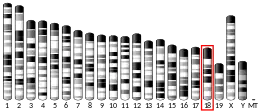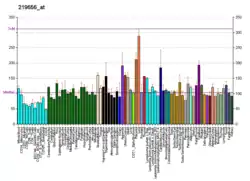PCDH12
Protocadherin-12 is a protein that in humans is encoded by the PCDH12 gene.[5][6][7]
| PCDH12 | |||||||||||||||||||||||||||||||||||||||||||||||||||
|---|---|---|---|---|---|---|---|---|---|---|---|---|---|---|---|---|---|---|---|---|---|---|---|---|---|---|---|---|---|---|---|---|---|---|---|---|---|---|---|---|---|---|---|---|---|---|---|---|---|---|---|
| Identifiers | |||||||||||||||||||||||||||||||||||||||||||||||||||
| Aliases | PCDH12, VE-cadherin-2, VECAD2, protocadherin 12, DMJDS1 | ||||||||||||||||||||||||||||||||||||||||||||||||||
| External IDs | OMIM: 605622 MGI: 1855700 HomoloGene: 9574 GeneCards: PCDH12 | ||||||||||||||||||||||||||||||||||||||||||||||||||
| |||||||||||||||||||||||||||||||||||||||||||||||||||
| |||||||||||||||||||||||||||||||||||||||||||||||||||
| |||||||||||||||||||||||||||||||||||||||||||||||||||
| |||||||||||||||||||||||||||||||||||||||||||||||||||
| |||||||||||||||||||||||||||||||||||||||||||||||||||
| Wikidata | |||||||||||||||||||||||||||||||||||||||||||||||||||
| |||||||||||||||||||||||||||||||||||||||||||||||||||
This gene belongs to the protocadherin gene family, a subfamily of the cadherin superfamily. The encoded protein consists of an extracellular domain containing 6 cadherin repeats, a transmembrane domain and a cytoplasmic tail that differs from those of the classical cadherins. The gene localizes to the region on chromosome 5 where the protocadherin gene clusters reside. The exon organization of this transcript is similar to that of the gene cluster transcripts, notably the first large exon, but no significant sequence homology exists. The function of this cellular adhesion protein is undetermined but mouse protocadherin 12 does not bind catenins and appears to have no effect on cell migration or growth.[7]
References
- GRCh38: Ensembl release 89: ENSG00000113555 - Ensembl, May 2017
- GRCm38: Ensembl release 89: ENSMUSG00000024440 - Ensembl, May 2017
- "Human PubMed Reference:". National Center for Biotechnology Information, U.S. National Library of Medicine.
- "Mouse PubMed Reference:". National Center for Biotechnology Information, U.S. National Library of Medicine.
- Wu Q, Maniatis T (Apr 2000). "Large exons encoding multiple ectodomains are a characteristic feature of protocadherin genes". Proc Natl Acad Sci U S A. 97 (7): 3124–9. doi:10.1073/pnas.060027397. PMC 16203. PMID 10716726.
- Wu Q, Maniatis T (Jul 1999). "A striking organization of a large family of human neural cadherin-like cell adhesion genes". Cell. 97 (6): 779–90. doi:10.1016/S0092-8674(00)80789-8. PMID 10380929. S2CID 6014717.
- "Entrez Gene: PCDH12 protocadherin 12".
Further reading
- Yagi T, Takeichi M (2000). "Cadherin superfamily genes: functions, genomic organization, and neurologic diversity". Genes Dev. 14 (10): 1169–80. doi:10.1101/gad.14.10.1169. PMID 10817752. S2CID 44844497.
- Nollet F, Kools P, van Roy F (2000). "Phylogenetic analysis of the cadherin superfamily allows identification of six major subfamilies besides several solitary members". J. Mol. Biol. 299 (3): 551–72. doi:10.1006/jmbi.2000.3777. PMID 10835267.
- Telo' P, Breviario F, Huber P, et al. (1998). "Identification of a novel cadherin (vascular endothelial cadherin-2) located at intercellular junctions in endothelial cells". J. Biol. Chem. 273 (28): 17565–72. doi:10.1074/jbc.273.28.17565. PMID 9651350. S2CID 25010153.
- Ludwig D, Lorenz J, Dejana E, et al. (2001). "cDNA cloning, chromosomal mapping, and expression analysis of human VE-Cadherin-2". Mamm. Genome. 11 (11): 1030–3. doi:10.1007/s003350010186. PMID 11063261. S2CID 35069268.
- Strausberg RL, Feingold EA, Grouse LH, et al. (2003). "Generation and initial analysis of more than 15,000 full-length human and mouse cDNA sequences". Proc. Natl. Acad. Sci. U.S.A. 99 (26): 16899–903. Bibcode:2002PNAS...9916899M. doi:10.1073/pnas.242603899. PMC 139241. PMID 12477932.
- Clark HF, Gurney AL, Abaya E, et al. (2003). "The Secreted Protein Discovery Initiative (SPDI), a Large-Scale Effort to Identify Novel Human Secreted and Transmembrane Proteins: A Bioinformatics Assessment". Genome Res. 13 (10): 2265–70. doi:10.1101/gr.1293003. PMC 403697. PMID 12975309.
- Ota T, Suzuki Y, Nishikawa T, et al. (2004). "Complete sequencing and characterization of 21,243 full-length human cDNAs". Nat. Genet. 36 (1): 40–5. doi:10.1038/ng1285. PMID 14702039. S2CID 21903526.




